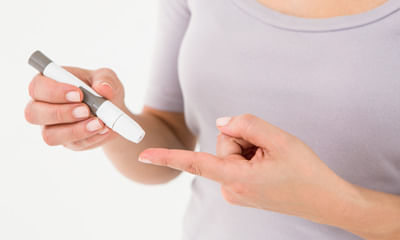Get the App
For Doctors
Login/Sign-up
Last Updated: Dec 20, 2019
BookMark
Report
Dietary Management For Diabetes
| DIETARY MANAGEMENT: |
| Your blood sugar level in your blood is closely connected to what you eat, so good and balanced nutrition is most important for living a healthy life with diabetes. Correct choice of food and in appropriate amount will help you to control your blood sugar levels, thus further preventing or delaying the complications. There is no particular diet that will suit everyone; it depends on the treatment, individual sensitivity and on the complication of the disease. So consult your physician before implementing any diet plans. |
| DO'S: |
| • Follow your doctor's instructions. • Do not stop or take any medications on your own. • Monitor your blood glucose by regular blood Glucose checking. • Do regular exercise and practice yoga. • Walk for at least 45 minutes regularly (follow advice of your physician). • Take extra care for your foot if you get a cut or a bruise, blister or swelling, see your doctor immediately. • Maintain your optimum weight. • Always carry a packet of biscuits, candy, juice or sugar along, if you feel giddy have one or two biscuits or one sweet. You may be hypoglycemic, see your physician Immediately. • Loose weight if obese as with diabetes the risk of developing heart disease increases. Loose weight gradually, one or two pounds a week. |
| AVOID: |
| • Do not undertake strict diet to loose weight without consulting your physician or a registered dietician. • Avoid sugars and any thing, which is high in sugar content. • Avoid artificial sweeteners. • Avoid canned fruits. • Avoid alcohol, smoking. • Avoid high calorie diet – fried, oily or buttered food. • Do not take appetite suppressants to control weight, they increase blood sugar levels. • Avoid chocolate, pastries, jams, honey and sweets. • Avoid potatoes, sweet potato, yam and other "underground vegetables". • Avoid fruit like chickoo, mango and bananas, or just consume a single slice a day. • Avoid sleeping in the day time. |
| CONSUME: |
| • consume frequent small meals at regular intervals through out the day, instead of eating heavy meals once or twice a day. This will help to avoid extremes of high or low blood glucose levels. • Consume snacks high in protein before sleeping, prevents hypoglycemia at night. • Consume about 2000 calories a day of which 50-60% calories coming from carbohydrates, 20% from proteins and less then 30% from fats. • Pregnant woman needs 300 calories more from second trimester and extra 10-12 gm of protein for the growth of the baby. • Have plenty of salads before you start your meal. • Carbohydrates: - Consume complex carbohydrates (high fiber foods) then the simple carbohydrate diet, both will provide similar amount of calories, but complex carbohydrates are high in fiber which helps in lowering the blood glucose levels. - Avoid sugar as every food contains little sugar, and they are of no nutritive value and considered as empty calories. - Consume bitter gourd (karela), string beans (Chaulee), cucumber (kakadi), onions and garlic which are very beneficial for diabetics. - Consume lots of green leafy vegetables, beans and legumes. - As much as possible eat raw fruits and vegetables then cooked ones, cooked food increases blood glucose levels as compared to raw food. • Fiber: - Consume high fiber diet (between 30 to 50 gm a day), it helps lowering the blood glucose levels - fruits, vegetables, peas, beans and whole- wheat breads, bran, brown rice, oats, seeds, nuts, barley are good sources of fiber. - Note: do not exceed more then 60 gm of fiber a day it can lead to nutrition deficiencies. • Proteins: - Patients with diabetic kidney need to consume less protein. - Consume protein more from plant sources then animal sources. - Prefer fresh fish or soy protein to poultry or meat; consume fish not more then 2 servings per week. • Fats: - Consume low fat diet – avoid fried food or mayonnaise based food except if non-fat mayonnaise is used, avoid egg yolk, bacon, butter etc., - Cholesterol intake should not exceed 200 mg per day. - Consume Polyunsaturated fats (PUFA), and monounsaturated fats instead of saturated fats and cholesterol. - Monounsaturated fats are mostly present in olive, canola, and peanut oils and in most nuts. - Consume not more then 5gm of fats, as PUFA, monounsaturated fats or saturated fats they all provide same amount of calories, though they are different in kind. • Consume 3-4 nuts regularly as they are high in proteins, fibers and also PUFA • Consume bitter gourd (karela) or have ½ cup or more of bitter gourd juice every day. • Before buying any products from the market check its label for amount of fats, carbohydrates and proteins. • Consume less of salt, not more then 2gm (2,000 mg sodium intake) a day. • Add garlic, onions and herbs to your food. • Also add turmeric to food, it lowers the glucose levels. • Vitamins: • Include foods that are rich in vitamin A, C, E as they have antioxidant property and thus protect from heart diseases. • Include adequate amount of B vitamins in your diet, certain B vitamins like folate, Vitamin B6 and Vitamin B12 lowers the levels of homocysteine. • Magnesium deficiency is usually seen in diabetics. The best sources of magnesium are dark green vegetables, legumes,cereals, wheat bread, fish, and nuts. • Chromium deficiency is observed to be a risk factor for diabetes type II. Shellfish, fish, eggs, wholegrain cereals, nuts are good sources of chromium. • Zinc deficiency is also observed in patients with diabetes Type II. Zinc is abundant in certain seafood, and whole grains. • Moderate alcohol intake is beneficial, especially red wine. One should limit to 1 drink per day for women and 2 drinks per day for men. Pregnant women and people at the risk of alcoholism should not consume alcohol. • Tea has proved to have beneficial effects on the heart, as it is rich in flavanoids and thus protects from damage from LDL, green tea as well as black tea are beneficial for arteries. |
| NOTE: |
| • Diet low in protein and salt along with high intakes of fluids can lead to hyponitremia, which can cause fatigue, confusion and can be life threatening. • One gram of carbohydrates equals four calories. • One gram of fat is equal to 9 calories, whether it's saturated or unsaturated. • One gram of protein contains four calories. |



+1.svg)
